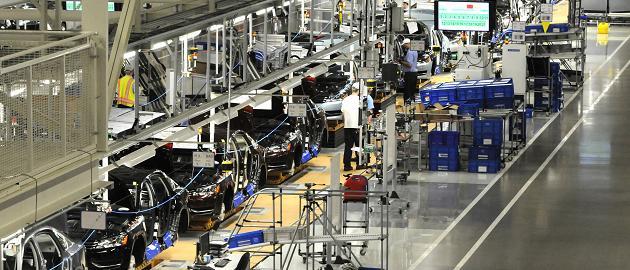UAW Still a Threat to Volkswagen Chattanooga

By Matthew Benzmiller
The Chattanooga, Tennessee Volkswagen plant has been a union battleground for the past several years.
In 2013 the United Auto Workers (UAW) union aimed to unionize the Volkswagen plant, and anti-union workers faced off with them in a campaign for the future of the plant.
If the UAW did unionize at Volkswagen, it would have led to the possibility of more unionized auto plants in the south to less union-friendly companies. Basically, if it couldn’t be done at Volkswagen, it couldn’t be done in other parts of the south.
What makes it more interesting is that Volkswagen itself was encouraging unionization of its plant. Works councils are a part of their European plants, so corporate felt it was natural to unionize in Chattanooga. The difference is that the unions in America are not the same as the work councils in Europe. Chattanooga workers knew that, and so the UAW lost the election to unionize in February 2014, with a vote of 712 against and 626 for unionization.
This was considered a huge loss for the UAW or any manufacturing union trying to work its way into the south. Conservative workers and locals knew that the UAW was dangerous to their political environment, as the liberal union has funneled millions of dollars in union dues to Democrat politicians at odds with Tennessee values.
But only later after the election, the UAW took a different route in trying to worm their way into unionization at the Chattanooga plant. A smaller group of maintenance employees were targeted for unionization as a micro-unit. Volkswagen fought it, citing that they are embedded in production, and corporate favored an election with all the workers in the plant. Not surprisingly, the National Labor Relations Board (NLRB) approved the request to hold an election for this subset workers.
Earlier this year, the NLRB upheld the vote for the maintenance workers. The NLRB had recently been approving these types of union elections in the past five years, so this was no surprise to the UAW. Volkswagen is still fighting back though. The company insists that if there is to be a union at their plant, that it be a decision from all the workers rather than a small subset of them. So Volkswagen brought the case to the U.S. Court of Appeals for the D.C. Circuit, hoping to reverse the previous NLRB decision.
The UAW has worked the laws in cooperation with the NLRB like the cronies they really are. Rather than accepting defeat at the will of the majority of workers at the plant, they are going to try to unionize the minority that wanted a union as much as they can. This is bad for those that were concerned about the UAW funding money to liberal politicians.
The arbitrary distinction between workers is a possible way for work place conflict says William Gould, professor at Stanford Law School. “To the extent that you balkanize the workforce, you have the potential for more conflict.” Volkswagen does not like this about the micro-union, and rightfully so. Problems could arise when laying off workers. Phillip Wilson, president of the Labor Relations Institute said that a larger group might be passive to other workers in a minority if they can ensure that their group will not be receiving as many pink slips.
Republican congressmen are aiming to change the law to reflect previous unionization standards. The Representation Fairness Restoration Act (S. 801) was introduced on March 19, 2015 by Senator Johnny Isakson. The bill is stalled though, and would probably be vetoed by President Obama. So November could change the labor game, depending on who is elected president and how many Republican seats are gained or lost.
The saving grace for non-union sympathizers at the Chattanooga Volkswagen plant is that they are in a right-to-work state, so they can opt out of the union if they like; a privilege that many other workers across the United States in non right-to-work states do not have, but deserve.





